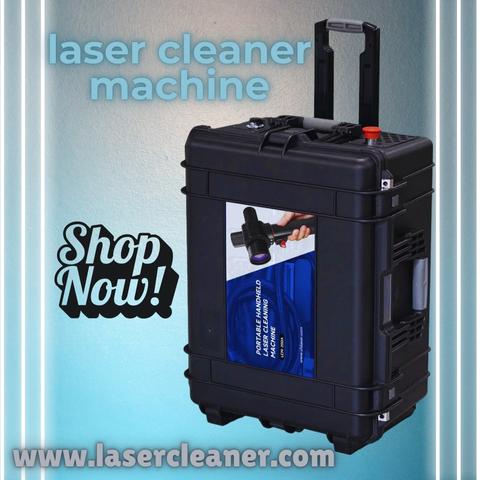Laser Cleaner Machine: Transforming Industrial Cleaning with Precision and Efficiency

In today’s industrial landscape, maintaining cleanliness and efficiency in manufacturing processes is a challenge that companies face across multiple sectors. From automotive workshops to electronics manufacturing, cleaning surfaces without causing damage is crucial. Traditional methods such as sandblasting, chemical cleaners, or mechanical scrubbing are often time-consuming, labor-intensive, and sometimes harmful to the environment or the materials themselves. This is where the laser cleaner machine has revolutionized the industry, offering a precise, safe, and highly effective solution.
A laser cleaner machine operates using advanced laser technology to remove impurities, rust, coatings, and contaminants from various surfaces. Unlike abrasive methods, the process relies on focused laser beams that target only the undesired layers, leaving the base material intact. This precision ensures minimal wear and tear on the surface while achieving thorough cleaning results that are consistent and repeatable. Industries that work with metals, ceramics, composites, and even delicate electronic components find laser cleaning to be especially beneficial.
One of the significant applications of laser cleaner machines is in the automotive sector. Vehicle components often accumulate rust, paint residues, oil, and dirt, all of which can affect performance and lifespan. Using a laser cleaner machine, workshops can efficiently restore metal surfaces to their original condition without risking structural damage. Moreover, the machine can access tight corners and intricate parts that conventional tools struggle to reach. This capability improves the overall efficiency of maintenance operations and reduces downtime for vehicles undergoing servicing.
In addition to automotive applications, the electronics industry has embraced laser cleaning for precision tasks. Circuit boards, delicate sensors, and micro-components require cleaning methods that do not introduce moisture, debris, or chemical residues. The laser cleaner machine provides a non-contact solution, making it ideal for these sensitive applications. By delivering controlled energy to the surface, it removes contaminants effectively without compromising the integrity of delicate electronic assemblies. This contributes to higher product quality and fewer manufacturing defects.
Another critical area where laser cleaner machines are transforming industries is metal fabrication and welding. Post-weld cleaning is often necessary to remove oxidation, scale, or spatter that can affect the appearance and functionality of metal parts. Traditional grinding or chemical cleaning methods are labor-intensive and can create inconsistent results. The laser cleaner machine offers a faster, more uniform alternative, ensuring clean welds and smooth surfaces that meet industry standards. This precision cleaning also supports downstream processes such as coating, painting, or adhesive bonding by providing a contaminant-free surface that enhances adhesion and durability.
The environmental aspect of laser cleaning is another compelling reason for its adoption. Unlike chemical cleaners, which can produce hazardous waste and require careful disposal, laser cleaning is a dry process that generates minimal residue. The byproducts are often non-toxic particles that can be safely collected or filtered, reducing the environmental footprint of industrial cleaning operations. This aligns with modern industry trends that emphasize sustainability and eco-friendly practices while maintaining high operational standards.
Maintenance of a laser cleaner machine is relatively straightforward, especially when compared to traditional cleaning equipment. Regular inspection of the optical system, checking alignment, and ensuring the cooling system functions properly help maintain optimal performance. Operators can quickly learn to use the machine effectively, as the interface is often intuitive, with programmable settings for different materials and contamination levels. This ease of use further enhances productivity and ensures consistent results across multiple applications.
Industries ranging from aerospace to construction also leverage laser cleaner machines for surface preparation and restoration tasks. In aerospace, components such as turbine blades, engine parts, and structural materials require precise cleaning to meet stringent safety and performance criteria. Laser cleaning ensures that these parts remain free of contaminants without risking surface damage. Similarly, in construction and infrastructure maintenance, laser cleaning can remove graffiti, corrosion, and weather-related deposits from metal and stone surfaces, restoring the original appearance and prolonging the lifespan of critical structures.
The versatility of a laser cleaner machine extends to cultural heritage preservation and restoration projects as well. Museums, historical sites, and conservation specialists use laser cleaning to remove dirt, grime, and oxidation from artifacts, sculptures, and monuments without harming the original material. This non-invasive method preserves the authenticity and integrity of valuable historical objects while allowing detailed restoration work that would be difficult to achieve with traditional techniques.
In addition to its cleaning capabilities, the laser cleaner machine contributes to operational efficiency by reducing labor costs and time. Manual cleaning methods can be slow, repetitive, and prone to human error, whereas laser cleaning provides automated, repeatable results that minimize human intervention. This efficiency allows businesses to allocate resources more effectively, improving overall workflow and reducing production bottlenecks.
As industries continue to seek innovative solutions for surface treatment and maintenance, the laser cleaner machine stands out as a versatile, precise, and environmentally responsible choice. Its applications span automotive, electronics, aerospace, construction, cultural preservation, and metal fabrication, offering reliable results that traditional cleaning methods struggle to match. By adopting laser cleaning technology, businesses not only improve operational efficiency but also contribute to sustainability and quality enhancement.
Final Thoughts
The laser cleaner machine represents a significant evolution in industrial cleaning and surface treatment technology. By combining precision, efficiency, and environmental responsibility, it addresses the limitations of conventional cleaning methods and meets the diverse needs of modern industries. From automotive maintenance to aerospace applications and cultural preservation, laser cleaning provides a reliable, high-performance solution that enhances productivity while preserving the integrity of materials and surfaces.
- Art
- Causes
- Crafts
- Dance
- Drinks
- Film
- Fitness
- Food
- Games
- Gardening
- Health
- Home
- Literature
- Music
- Networking
- Other
- Party
- Religion
- Shopping
- Sports
- Theater
- Wellness


